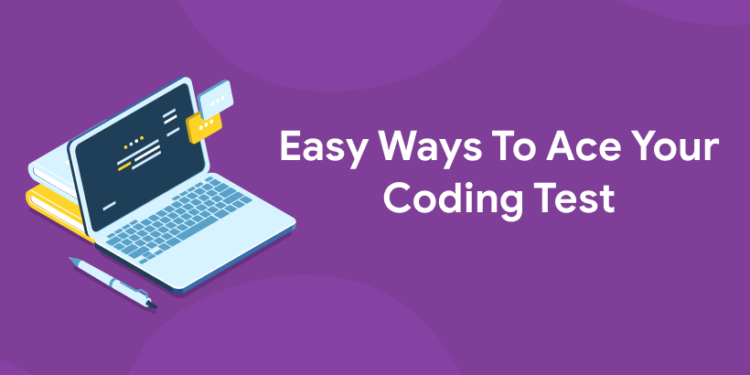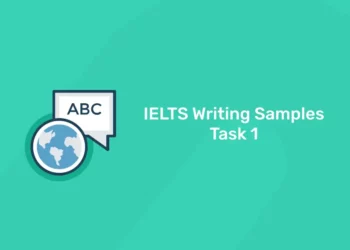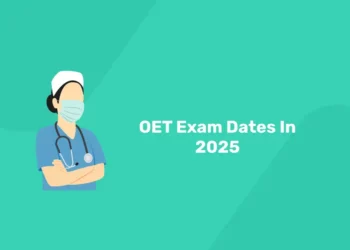Table of Contents
It’s no secret that coding tests are a core part of your job interview process if you’re trying to get hired as a developer at one of the top companies in the industry today. That said, even if you’re not interviewing with top-tier companies, you can probably expect a coding test as part of your application process, so it’s in your best interest to prepare accordingly. Coding tests can be intimidating, especially if you didn’t study properly or don’t have enough experience with coding languages. But there are plenty of things you can do to help improve your chances of success before, during, and after the test takes place. This article will show you how to ace your coding test by following these simple steps and tips that experts recommend. Before you go into your next coding test, make sure you are prepared with these easy ways to ace your coding test! These tips will not only help you prepare but also improve your approach to problem-solving and deepen your knowledge of the language and its syntax. When you walk out of the interview room, you’ll be ready to ace that coding test and land that new programming job! So what are you waiting for? Make sure you know how to pass your coding test before it’s too late!
1) Get Experience
1: Which of the following data structures allows elements to be added and removed in a Last-In, First-Out (LIFO) order?
Experience is by far your best teacher. It doesn’t matter how many lectures you attend or books you read, real-world experience is what’s going to make or break your coding test grade. So, get some—as much as possible. Start by helping out a friend who has an idea for a web app but doesn’t know how to code it up. Or maybe there’s a local non-profit you want to build something for; go volunteer and ask for coding lessons in exchange for your work time. If that sounds like too much of a commitment, take some time off from school (with approval from your college) and join an accelerator program where you can partner with someone else who needs help getting their company off the ground. You’ll be doing grunt work, but at least you’ll be building real-world skills. And if none of those options sound appealing, then just practice on your own! There are tons of online resources for beginners looking to learn HTML/CSS and other basics. You could also pick up a book or two on JavaScript/Ruby/Python if that’s more your speed. The key here is not to waste any time! Don’t fall into cramming mode before a big exam. It won’t help you retain information long term, and chances are you’ll forget everything once finals week comes around anyway. Just keep learning, even if it’s slow progress at first—you’ll get there eventually. And once you’ve built enough experience under your belt, studying will become less important than honing your new programming skills through hands-on projects.
2) Use Your Free Time To Learn
There are lots of ways to learn and improve your coding skills without anyone knowing about it. Learn in your spare time, at work, or even before you go to bed. You can teach yourself by picking up a book, watching YouTube videos on new topics, or enrolling in a beginner’s coding class at a local college. Whatever you do, make sure you have fun with it! After all, learning a skill should be enjoyable! It’s easy to get bogged down by difficult concepts, but if you keep things interesting and interactive, you’ll stay motivated. The goal is for coding to become second nature so that it becomes easier for you when preparing for your interview. Don’t rush yourself through each lesson; instead, take breaks between practice sessions so that you can process what you’ve learned and allow yourself time to absorb new information as well as reflect on what worked best for you during practice. If you find yourself getting frustrated with a particular concept, try taking a break from it for a while. When you come back to it later, try approaching it from another angle or ask someone else how they would solve the problem. If possible, sign up for an online programming course (such as Coursera) that will introduce you to more coding languages than just Java. This will help familiarize you with different syntaxes and basic structures while also giving you an opportunity to use your own code editor (such as Sublime Text). By taking advantage of these opportunities while they’re available, not only will you learn more but also discover which types of languages interest you most.
Enroll in our latest coding courses in the Entri App!
3) Practice Writing Algorithms
Algorithms are mathematical solutions or steps for solving a problem. What’s important to know about them is that they’re used in virtually every program today, whether it’s web-based or software. To ensure you have a good grasp of them, sit down and write out algorithms for problems you frequently encounter in your daily life; such as: what is a fair tip? When do I refill my gas tank? How can I make my commute faster? Practice writing out these problems and their steps until you feel comfortable with them. And then try doing it without pen and paper; writing algorithms on computer programs like Visual Studio will help build your muscle memory, but only if you write out multiple iterations of how to solve those same problems from scratch. You’ll be surprised at how quickly you become proficient at coding once you start practicing. So get to it! The fastest way to learn how to code is by taking a class. This post provides an overview of some of the most popular options available, along with some tips for choosing one that fits your needs best. When picking a course, first ask yourself why you want to learn programming and what exactly you want to accomplish with it.
4) Find a Study
So you think you can learn everything you need from a book and an online tutorial? I hope so because that’s your job. But having a study buddy also helps in several important ways. First, it gives you someone to bounce ideas off. When your friend asks how much longer until lunch and how many more questions are on your practice test, it reminds you why learning these things is important in the first place (no matter how difficult they might be). Second, it provides social reinforcement: just knowing someone else cares about whether or not you pass makes it easier for you to stay motivated and focused. Third, it provides accountability: if you know your buddy will ask you about how your studying went after class tomorrow, then there’s less chance that you’ll blow off some last-minute cramming tonight. And finally, it keeps you honest: when someone else knows what questions are on today’s quiz or exam, there’s no reason to look them up ahead of time…and every reason not to cheat!
Get the latest updates on coding courses in the Entri App!
5) Drink Water!
Dehydration can be easily mistaken for hunger. When you’re feeling thirsty, drink water before eating a snack. If you do find yourself hungry, then check in with your body and see if it’s actually the thirst you’re experiencing. Take a few sips of water, wait a few minutes and see if that holds off any cravings until your next mealtime arrives. Staying hydrated will also help you think more clearly during coding tests, which is crucial! It’s important to remember that everyone has different needs when it comes to drinking fluids, so make sure you know how much you should be drinking each day by tracking it in a journal or keeping an eye on your urine color. The darker yellow your urine becomes, the more dehydrated you are—so make sure to up your intake accordingly. Also, remember that coffee (and other caffeinated beverages) act as diuretics and may cause dehydration by flushing out all of those necessary liquids from our bodies too quickly. Drinking extra water will not only help flush out toxins but may also keep us energized throughout our long days at work or school. So stay well-hydrated!
6) Ask Questions On Forums
If you’re still confused about a coding concept, don’t be afraid to ask for help. You might be surprised at how many people are willing to help out, especially if you’re polite and not just asking for answers outright. There are lots of forums that cater specifically to coding, but even general tech forums will have folks who are happy to help. The #1 rule? Make sure your question is clear so that your fellow coders can understand it clearly and offer good advice. Also make sure you include what programming language you’re using (and what version), as well as any other relevant details (like what platform/OS). Finally, before posting your question, do some research—there’s a good chance someone else has asked your same question before! Google is your friend here. Oh, and remember: being patient with other people’s questions goes both ways. Be nice and helpful when answering others’ questions; otherwise, you won’t get much in return when you need it.
7) Don’t Google The Answers
Don’t be that guy or girl. It’s pretty straightforward and easy—just don’t do it. You won’t learn anything, you’ll get caught, and it ruins everything. Seriously, just don’t do it. If you feel like you absolutely have to look something up, then wait until you can find a computer in person (or ask someone with a computer to help you), use a different browser than your own personal one (so no cookies getting set), clear your cache before and after every page, close all other tabs and windows, change your IP address using Tor or something similar for maximum safety. And even then—you might not get away with it 100% of the time. But if you follow these steps, you’ll at least reduce your chances of getting caught. Also remember: There’s never any shame in asking for help! The people working there are there to test you on what they know, so they’re probably more than happy to answer questions when asked politely. But also remember: They want to make sure that everyone who passes knows what they’re doing, so if they think someone cheated… well… let’s just say that doesn’t go over too well.
8) Rest The Night Before
It’s tempting to cram a few extra hours of studying in before your big test, but giving yourself plenty of time to rest up is a much smarter move. You want to walk into that room feeling confident and prepared, not tired and run down. Even if you think you can ace a code test without breaking a sweat, allow yourself time for relaxation before taking your exam. When you’re well rested and feeling good about your knowledge base, any new coding skills or concepts will come easier than ever. Just be sure to avoid pulling an all-nighter—even one night of poor sleep can lead to brain fog during testing, which means less focus on solving problems and more time spent trying to remember what you studied. This post was written by Joe Grant who is currently working as an intern at VirtualLogix. Joe loves computers and technology because it makes our lives so much easier! He’s always looking for ways technology can be implemented in his everyday life. When he isn’t exploring new tech, you’ll find him hiking with friends or playing sports like volleyball and basketball.
Get the latest updates on coding courses in the Entri App!
9) Don’t Take It Too Seriously
A coding test may seem like a lot of pressure, but there’s a good chance you’re only as good as your most recent test. Put simply, if you get an A on your last test, odds are you’ll do well on this one too. Think of it as just another part of getting hired—you wouldn’t worry about a job interview because you already have a job. The same should go for your coding tests. Don’t stress out about them, and focus on being yourself and having fun with it. If something comes up that seems difficult or frustrating during an interview or testing period—don’t panic! You’ll be fine. It’s all part of becoming a coder. Just take it easy and try to enjoy yourself. Practice makes perfect. When someone says practice makes perfect, they’re not kidding around. Practicing regularly is essential to doing well on a coding test (or any kind of exam). This means more than just memorizing what you need to know: practice actually makes permanent changes in your brain, so regular practice is especially important when preparing for big exams such as interviews and coding tests. Practice doesn’t necessarily mean sitting down at home by yourself; ask friends or classmates if they want to help each other learn the material through group study sessions. Plus, it’s easier than ever before to find free online resources these days!
10) Enjoy Yourself!
It is important to stay calm and relaxed during a coding test. You will have time before and after each problem, so feel free to take breaks whenever you need. If you are feeling anxious or nervous, just slow down and take your time with each question. It is easy to go too fast in these types of situations, which can cause unnecessary mistakes that cost valuable points. An important thing to remember about coding tests is that they measure your knowledge, not your ability. Thus it’s ok if you don’t finish all questions on time as long as you get most of them right! The more problems you solve correctly, the better your chance of getting an offer. So do your best and enjoy yourself! There is no penalty for guessing, so if you aren’t sure about something, choose whatever answer seems reasonable at first glance. As long as you’ve done enough practice and studied hard, you should be able to eliminate some options through the process of elimination. Also, look out for patterns – if one answer seems correct every time then there’s a good chance it might be true! If you are interested to learn new coding skills, the Entri app will help you to acquire them very easily. Entri app is following a structural study plan so that the students can learn very easily. If you don’t have a coding background, it won’t be any problem. You can download the Entri app from the google play store and enroll in your favorite course.











